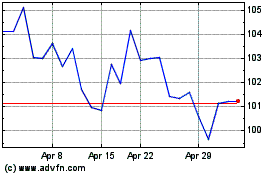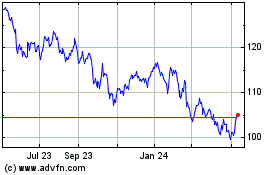Plant-Based Meat Makers Compete on Price-Update
March 03 2020 - 10:40AM
Dow Jones News
By Jacob Bunge and Heather Haddon
Makers of plant-based meat alternatives are cutting prices, as
startups compete with food-industry giants for slices of the
rapidly growing market.
Impossible Foods Inc. said Tuesday that it had reduced wholesale
prices for its products by 15%. Big food companies -- including
Nestlé SA, Smithfield Foods Inc., Cargill Inc. and food distributor
Sysco Corp. -- have recently set plans to introduce their own
meat-free patties, sometimes at lower prices than those charged by
startups, like Impossible, that helped popularize plant-based
products.
Impossible and rival Beyond Meat Inc. are jockeying with
food-industry giants for a plant-based meat alternative market that
is growing faster than sales of traditional meat. Plant-based meat
sales in U.S. retail stores totaled a little over $1 billion for
the 52 weeks ended Jan. 25, according to Nielsen, up 14% from the
prior year. Sales of traditional meat grew 0.8% to $96 billion over
that period.
Using new engineering and production techniques, companies can
form plant fibers and proteins into burger patties that sizzle and
bleed like traditional ground beef. Restaurants are signing up to
add them to menus to lure sustainability-minded consumers.
"We're getting hit up by everybody," said Paul Griffin, head of
culinary research for BurgerFi International LLC, a Florida-based
chain that has sold Beyond's patty for about three years. He said
Sysco recently offered a competing plant-based burger to BurgerFi
that cost about 5 cents less per patty than the Beyond product, but
that he had no plans to switch.
Starbucks Corp. and Yum Brands Inc.'s KFC division have added
plant-based meat products to their menus this year. McDonald's
Corp. in January broadened a test in Canada of a sandwich made with
a Beyond patty. Burger King and White Castle put Impossible's
plant-based burger patties on sale across the U.S. over the past
two years.
Impossible and Beyond say they use less grain, water and energy
to make burgers from soy and pea protein than companies that feed,
slaughter and transport livestock. But the plant-based production
processes are more expensive than traditional burger making, partly
because meat mimics are made on a scale far smaller than the global
meat industry.
Impossible and Beyond say they are working to change that
dynamic by adding more manufacturing plants and making their
processing techniques more efficient. A lower price point will make
their products more appealing to customers, plant-based food
proponents say.
"A lot of people won't try it unless it's cost competitive,"
said Dennis Woodside, president of Redwood City, Calif.-based
Impossible.
Impossible said its 15% price cut would reduce what it charges
for direct sales of its plant-based meat to about $7.90-$8.50 a
pound. Impossible said it couldn't specify how the price cut would
affect restaurants and retailers that buy its products through
distributors.
Beyond Chief Executive Ethan Brown said competitors are trying
to undercut the El Segundo, Calif.,-based company on price. So far,
he said, Beyond has resisted broadly discounting its burgers, but
the company aspires to match the price of traditional meat with at
least one of its products by 2024. Beyond reported a $452,000
quarterly loss last week, though sales more than tripled.
Burger King, owned by Restaurant Brands International Inc.,
sells its Impossible Whopper for $5.99, around a dollar more than
the original beef version. This year the chain added the Impossible
sandwich to its two-for-$6 promotional menu to entice additional
customers.
"Some of the feedback we got back from guests is they felt it
was too expensive," Restaurant Brands's CEO Jose Cil said in an
interview last month.
Some Burger King franchisees said they haven't seen much of a
sales increase for the sandwich since it was added to the
promotional menu. Chris Finazzo, Burger King's president for the
Americas, said Impossible Whopper is drawing repeat customers to
the chain's restaurants.
Joe Pobereskin, a 60-year-old sales representative from the
Chicago suburbs, said he tried an Impossible Whopper last year,
going so far as to conduct a blind taste test to compare it with
the beef version. He was amazed at how similar they tasted, but he
hasn't bought an Impossible Whopper since.
"I don't feel it's worth paying more to eat Impossible Whoppers.
I'm not a vegetarian," Mr. Pobereskin said.
Write to Jacob Bunge at jacob.bunge@wsj.com and Heather Haddon
at heather.haddon@wsj.com
(END) Dow Jones Newswires
March 03, 2020 10:25 ET (15:25 GMT)
Copyright (c) 2020 Dow Jones & Company, Inc.
Nestle (PK) (USOTC:NSRGY)
Historical Stock Chart
From Mar 2024 to Apr 2024

Nestle (PK) (USOTC:NSRGY)
Historical Stock Chart
From Apr 2023 to Apr 2024
